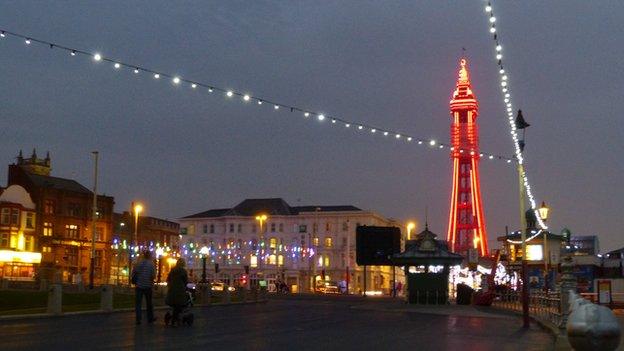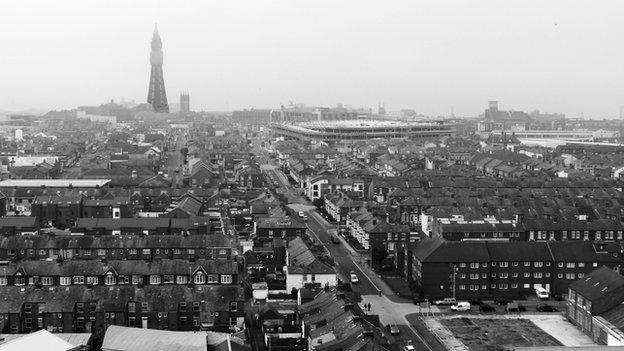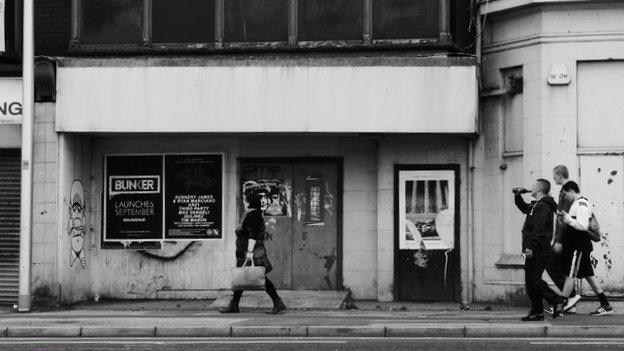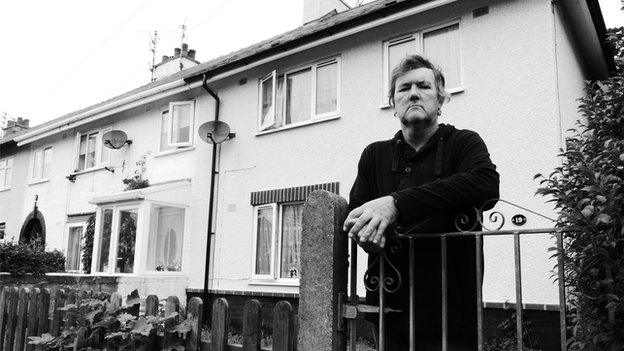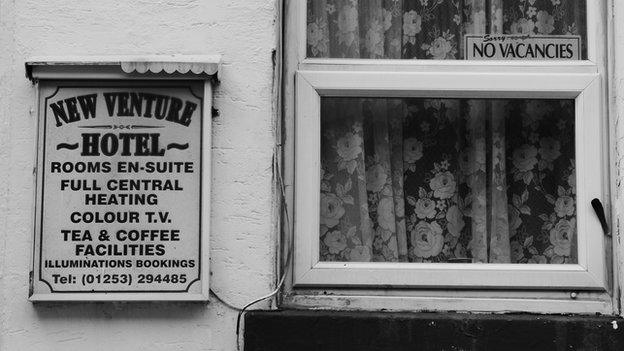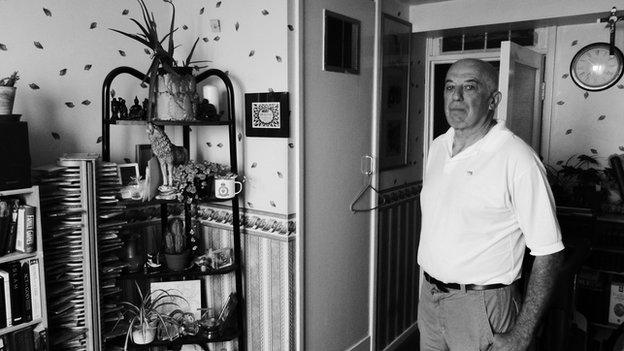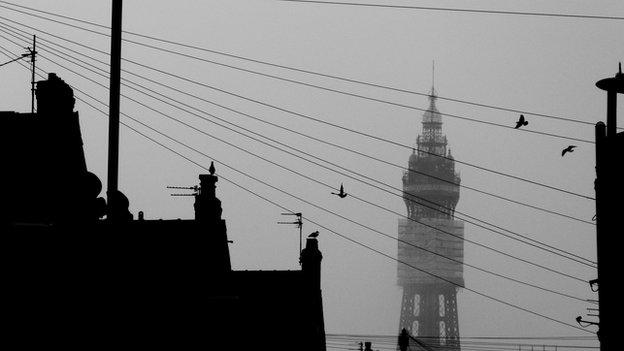How six months of benefits changes hit hard in Blackpool
- Published
At this time of year, Blackpool's illuminated mile sparkles with neon self-confidence.
But take in the view from the 19th floor of a council tower block in the Queen's Park district, and the town takes on a decidedly monochrome quality.
For parts of this town appear to be stuck in an earlier era.
A myriad of bed and breakfast hotels still display "no vacancies" signs between lacy net curtains, advertise rooms "en suite", and promise the delights of "colour" television.
But this year, for once, Blackpool is in the vanguard of social change.
According to experts from Sheffield Hallam University, the government's welfare changes have hit harder here than anywhere else in Britain.
When those changes came in six months ago, their report predicted that, on average, adults of working age in the town would lose £910 a year.
That compares with an average loss across the country of £470.
The government also forecast that more people would be affected by the housing benefits changes in the North West than anywhere else.
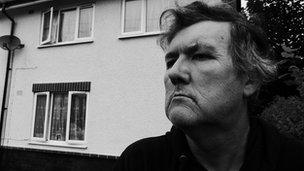
'Diabolical'
"Those figures don't surprise me at all," says Melvyn Holmes, a former miner who now cares for his disabled wife in a Blackpool council house.
Because their two children have left home, they have lost £80 a month from their housing benefit, as a result of the end of the spare room subsidy.
For the first time they also have to pay £20 a month towards their council tax, making them at least £1,200 a year worse off.
"We were all right until the bedroom tax started," he says.
Struggling to cope with debts of up to £5,000, they have now applied for a smaller house, just as the government had hoped.
"It's diabolical," says Melvyn.
"They're trying to force people out of their homes. We've been here for 20 years, but now we're being forced out."
Evictions
The changes to council tax benefit have also hit Blackpool particularly hard, as the council decided to pass on most of the 10% shortfall in government grant to its residents.
Mike Clague, a former RAF chef whose 19th floor flat has such a spectacular view, is having to find £15 a month extra.
"It doesn't sound much," he says. "But on top of all the other bills, it's a lot."
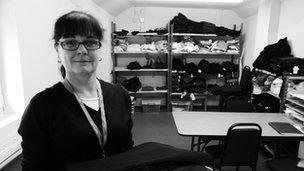
Ann Morris gives out school uniforms to those who cannot afford them
He has had to cut back on food as a result. Chocolate has become a once-a-week treat.
In Blackpool even those on jobseeker's allowance (JSA) have to find an extra £206 a year.
Many people have not yet paid anything.
"We recently had a huge influx of clients for non-payment of that money," says Julia Hannaford of Blackpool Citizens Advice.
"In one week we saw 40 people."
For those that are paying, the extra outgoings have stretched household budgets. Half the council tenants in Blackpool are behind with their rent.
In two or three cases, the local housing association has now obtained suspended possession orders, the first stage in the eviction process.
Sanctions
Elsewhere in the North West there are already some striking memorials to the first six months of the benefits changes: the houses that no one wants.
In Sefton, on an estate once known as Beirut, there are roads where dozens of people have moved out.
One resident of Daley Road points out 10 empty houses in her street.
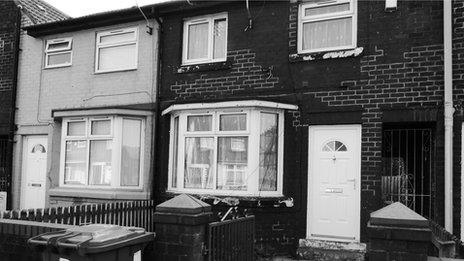
One of the empty houses in Daley Road
"They don't even bother to board them up anymore," she tells me.
"It's all because of the bedroom tax. Nobody wants a three bedroom place anymore."
On this part of Merseyside, community workers also report that, since April, more people are having their benefits temporarily stopped.
JSA claimants, for example, now have to prove that they are job hunting, by applying online.
But not all are computer literate.
Ann Morris, a development worker in Litherland, says that as a result many parents can no longer afford to buy school uniforms.
She and her colleagues have set up a uniform bank to help.
"They all want their kids to go back to school with new uniforms. But some have benefit sanctions, so they just don't have the money," she says.
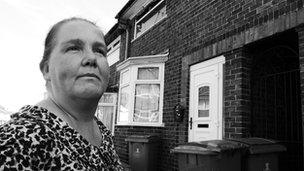
'Blind Scouse'
Carol Wilson, a carer from the Tuebrook area of Liverpool, was herself sanctioned earlier in the year.
She lost one week's Employment and Support Allowance (ESA), as a result of being in hospital.
Since April she has also had to find £80 a month as a result of having a spare room, and £9 a month extra for council tax.
Along with all claimants, she has also been affected by the 1% cap on annual benefits increases.
She, her partner, and her son now share their bath-water to try to economise.
"I never thought I'd see the day that we'd all get in and share a bath. A treat is getting in the bath first."
And she stretches a pot of stew, known as scouse, so that it lasts for three days.
"You just add potatoes each day. When the meat runs out, it's known as "blind scouse".
Blind scouse is certainly making a comeback in Liverpool at the moment, she says.
Coping
All along the Department for Work and Pensions (DWP) has insisted that the changes are not about saving money, but about encouraging more people into work.
Indeed since claimants were warned about the cap on total benefits back in April, the DWP says more than 15,000 have been helped to find jobs.
"Since April we have made great strides delivering our reforms," a DWP spokesman told the BBC.
"The rollout of universal credit and personal independence payments have begun, reforms to housing benefit are making the system fairer and the benefit cap is now in place across the country."
The government also says it has cut income tax for 25 million people, saving a typical taxpayer £700 a year.
It claims the typical household will also save £600 as a result of council tax being frozen for five years.
And even among those hit by benefit cuts, there are those who support the principles of the reforms.
"I do think it's right that people should be in work if they can be," says Carol Wilson.
"And I don't think being on benefits should be too comfortable.
"Whilst I would like more, the country is in a crisis. And I cope with what I have," she says.
